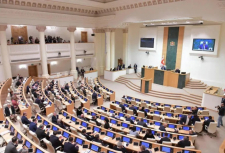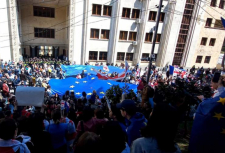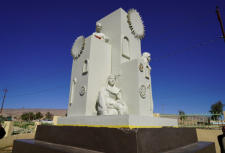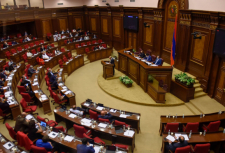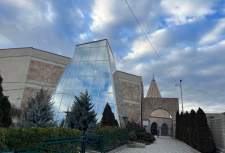Yezidis of Georgia: religion as self-consciousness
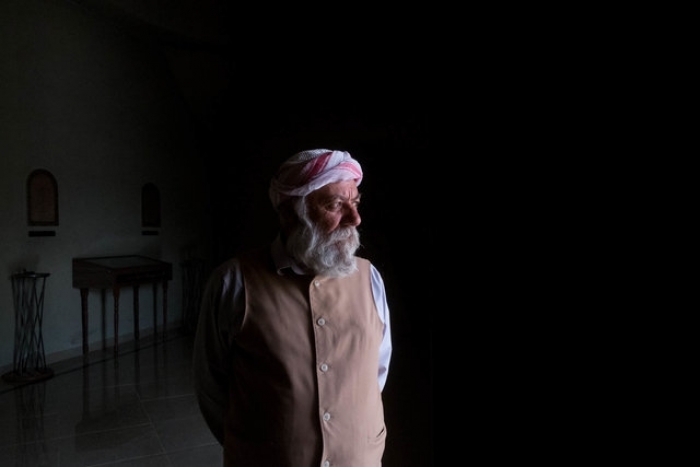
Located on the outskirts of Tbilisi in a rather large area of Varketili, this building can be mistaken for an ordinary office building of earthy color. However, the cone-shaped dome suggests that it was built for a completely different purpose, and few outsiders dare to look inside and find out that this squat building, bordered by dry grass – is Yazidi temple.
Yazidis, ethnically related to the Kurds, live mainly in Northern Iraq, Northern Syria and Eastern Turkey; they are adepts of a kind of monotheistic religion. Well-known in the Caucasus as a result of their residence in the territory of Armenia, which has every chance to become a place where the world's largest Yazidi temple is; they are considered to have settled in Georgia in the early XIX century. But, despite its history on the territory of Georgia, this ethno-confessional group, according to its members, faces problems. According to official data, since 2002 the number of Yazidis in Georgia has decreased three times, and now there are about 12, 000 people on the territory of the country. Overall, they account for less than 1 percent of the country's 3.7 million population. Labor migration to Russia and Turkey plays an important role in this process; Yazidis, who fled ISIS terrorists in Iraq and Syria a few years ago, have reportedly left Georgia for lack of jobs. However, assimilation into the predominantly Orthodox Christian community of the country also had its impact, says the head of the spiritual Board of Yazidis of Georgia Dmitry Piribari. In the urban environment, many young Yazidis do not want to be different from their peers, he says, and therefore often turn to other religions. This trend really bothers Piribari. For Yazidis, ethnic identity and religion are synonymous.
“They have only a memory of their Yazidi origin," he says about the Yazidis who converted to Christianity. "They lose everything else: their identity, their religion.” ”A true Yazid must profess his religion," emphasizes the 59-year-old chief priest of the Yazid temple in Tbilisi, Shekh Nuri, who was born in Russia.
Tags:
Yezidis of Georgia: religion as self-consciousness

Located on the outskirts of Tbilisi in a rather large area of Varketili, this building can be mistaken for an ordinary office building of earthy color. However, the cone-shaped dome suggests that it was built for a completely different purpose, and few outsiders dare to look inside and find out that this squat building, bordered by dry grass – is Yazidi temple.
Yazidis, ethnically related to the Kurds, live mainly in Northern Iraq, Northern Syria and Eastern Turkey; they are adepts of a kind of monotheistic religion. Well-known in the Caucasus as a result of their residence in the territory of Armenia, which has every chance to become a place where the world's largest Yazidi temple is; they are considered to have settled in Georgia in the early XIX century. But, despite its history on the territory of Georgia, this ethno-confessional group, according to its members, faces problems. According to official data, since 2002 the number of Yazidis in Georgia has decreased three times, and now there are about 12, 000 people on the territory of the country. Overall, they account for less than 1 percent of the country's 3.7 million population. Labor migration to Russia and Turkey plays an important role in this process; Yazidis, who fled ISIS terrorists in Iraq and Syria a few years ago, have reportedly left Georgia for lack of jobs. However, assimilation into the predominantly Orthodox Christian community of the country also had its impact, says the head of the spiritual Board of Yazidis of Georgia Dmitry Piribari. In the urban environment, many young Yazidis do not want to be different from their peers, he says, and therefore often turn to other religions. This trend really bothers Piribari. For Yazidis, ethnic identity and religion are synonymous.
“They have only a memory of their Yazidi origin," he says about the Yazidis who converted to Christianity. "They lose everything else: their identity, their religion.” ”A true Yazid must profess his religion," emphasizes the 59-year-old chief priest of the Yazid temple in Tbilisi, Shekh Nuri, who was born in Russia.
Tags:

